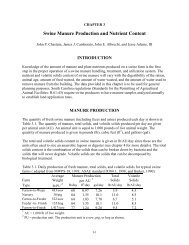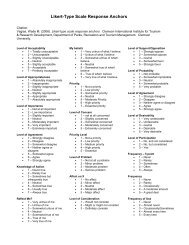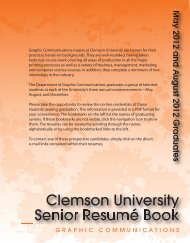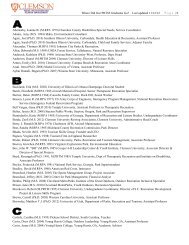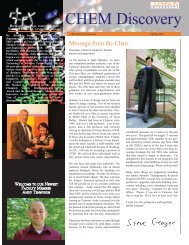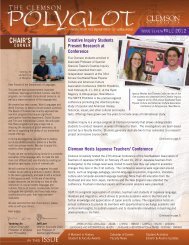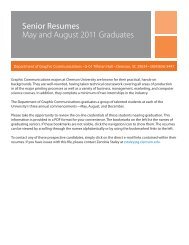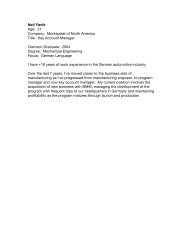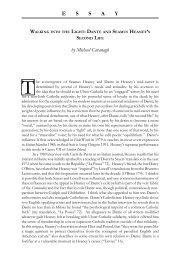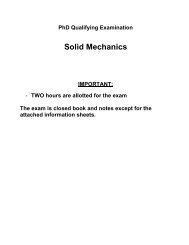Woolfian Boundaries - Clemson University
Woolfian Boundaries - Clemson University
Woolfian Boundaries - Clemson University
You also want an ePaper? Increase the reach of your titles
YUMPU automatically turns print PDFs into web optimized ePapers that Google loves.
BUT THE BARRIER IS IMPASSABLE<br />
as for “miners like Heslop and Brierley, plasterers like Hilton and Halward, the physical<br />
exhaustion of long shifts made sustained writing very diffi cult,” and “John Sommerfi eld,<br />
James Hanley and George Garrett, all seamen” were only able to write because of “long<br />
and regular periods of unemployment” (99). Indeed, one of the authors of Seven Shifts excused<br />
his essay to Common by observing that “I am a labourer and have to labour to live,<br />
it leaves me no time or energy for this game” (Common x). Even when potential authors<br />
did fi nd time, the conditions in which they wrote often presented them with further diffi<br />
culties. Another potential contributor who failed to complete a manuscript, for example,<br />
explained to Common that “I got 3,000 words done, Jack, but it can’t be helped, you<br />
know the way we live in this bloody tenement, while I was out the baby got hold of the<br />
sheets and messed ‘em up, so you’ll have to count me out” (ix). Cyril Connolly’s famous<br />
“enemy of good art,” the “pram in the hall” (127), presented the greatest diffi culty to those<br />
who lacked access to studies, nurseries, and nannies.<br />
In A Room of One’s Own, Woolf had explored the ways in which poverty, domestic<br />
work, and a lack of privacy had prevented women from writing. Th e problem, she insisted,<br />
was that<br />
Intellectual freedom depends upon material things. Poetry depends upon intellectual<br />
freedom. And women have always been poor, not for two hundred years<br />
merely, but from the beginning of time.… Women, then, have not had a dog’s<br />
chance of writing poetry. (106)<br />
Th e solution was “fi ve hundred a year for each of us and rooms of our own” (112). As<br />
George Orwell later observed, the “fi rst necessity” for a writer “just as indispensable to<br />
him as are tools to a carpenter, is a comfortable, well-warmed room where he can be sure<br />
of not being interrupted; and, although this does not sound much, if one works out what<br />
it means in terms of domestic arrangements, it implies fairly large earnings” (236). Th is<br />
necessity was available to few working-class writers, and fewer still, if any, had the “fi ve<br />
hundred a year” Woolf advised the students of Girton to earn “by your wits” (AROO 66).<br />
Th e inter-war period saw a widespread reduction in working-class incomes caused by<br />
unemployment and the resultant pressure on wages. In 1927, two years before A Room of<br />
One’s Own was published, 1,194,000 insured workers were unemployed, and by the end<br />
of 1930, when Life as We Have Known It was issued, this fi gure had reached 2,500,000<br />
(Laybourn 9). Th e emphasis on insured workers, as Richard Croucher observes, itself<br />
excluded a number of important groups, not least “married women” for whom “there was<br />
no fi nancial benefi t in signing on but who would have welcomed work” (14). For many<br />
of those in work, any reductions in money wages were off set by defl ation. However, the<br />
1930s in particular saw an increasing “gap between those in and out of work” (108) and<br />
by 1937 “the average workless man or woman received in benefi t only half the money<br />
value of a normal wage” (McKibbin 117). Th e Depression had a particular impact on areas<br />
dominated by “traditional” industries, with 18.2 per cent of coal workers out of work<br />
by 1929, rising to 41.2 per cent by 1932 (Laybourn 8). Th is had an immediate eff ect on<br />
a number of the contributors to Davies’s collection. Mrs. F. H. Smith, for example, whose<br />
husband, a collier, was out of work, and who had to keep her family “out of £1 12s and to<br />
pay 7/10 rent out of that” (69), observed that it “is heartbreaking to see the unemployed<br />
39



